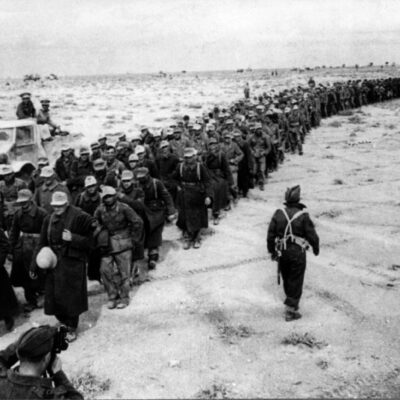“Herby Frootko’s war exploits” by Neil Behrmann, member, author and journalist
When I was a little boy, I used to play with a desert helmet. It belonged to my Uncle Herby. He also gave me a picture book, which a comrade had written. It was about desert ant princes and princesses. When I was older, Herby, who was slim and about five foot eight, used to play cricket with me. He would rub his glasses, smile and bowl a wicked spinner. For those who hardly knew him, Herby was a typical travelling salesman who enjoyed jokes and banter.
I wondered why he never talked about the war, but through family and fellow veterans, I found out about the real Herby Frootko.
Herby and my mum Anne were the youngest of four siblings and when their mother died from a brain tumour in 1936, they were grief stricken. Herby, highly intelligent, and an outstanding sportsman, moved to a new school. He hated it and as soon as he completed his final year, he sought independence. When war was declared he decided to be a volunteer against the Nazis and at the age of 17 joined the Transvaal Scottish Regiment.
After initial training in South Africa, the troops went to a camp in Kenya and then north Africa. Their task in the Libyan desert was to maintain a presence in the port of Tobruk.
Since Herby had never revealed his part in the fighting, I had to draw on the memoirs of Hillie Feldman*, one of his war time pals.
Before the Tobruk battle, Hillie had a bad eye infection and was sent to a New Zealand military hospital near Cairo. There he met Herbie, who was also hospitalised. When they recovered, they asked the New Zealand doctor and captain whether they could have a week’s leave to tour Palestine. They went to Tel Aviv, which in 1942 was “a little white village with a few buildings and to the Wailing Wall, where British Soldiers stood guard.
Soon afterwards Hillie and Herby had to join their fellow soldiers.
“We broke through a Libyan wire to help the SA forces at Tobruk,” Hillie wrote. “This soon became the most hectic and dangerous time of our lives.”
General Erwin Rommel, the “Desert Fox”, surrounded the South African forces with his Panzer tank division. The fighting worsened. The two friends were separated and would only meet again when the war ended. Hillie, manning a machine gun, lost two comrades and a German sniper killed the colonel in charge. War correspondents described the battle as frenzied and confused. Communications were poor in a battlefield that was spread over a wide area. Troops, who had to protect themselves from tank shells and constant aerial bombardment, had insufficient anti-aircraft guns.
“After a three-day fight against Rommel’s forces, our infantry Brigade was no match for them,” Hillie wrote. “There were terrible casualties on our side and we had to surrender.”
Fortunately, Herby survived and was not wounded. He never discussed the terrors and chaos of the Tobruk battle. Herby was a feisty character and knowing his courage, he might well have been one of the soldiers who wanted to fight on. There was an eventual military enquiry into the June 1942 Tobruk military disaster. Almost 33,000 soldiers surrendered, the second worst defeat after the Singapore debacle. About a third were South African. Soldiers who managed to escape the Germans complained that General Hendrik Klopper, the SA commander in charge of the Tobruk defence, should not have surrendered so swiftly.
Hillie narrated that almost 11,000 South African prisoners of war walked for three days in the hot desert with hardly any water and food. The thirsty throng struggled on and the weak had to be supported or left to die. It was the beginning of prisoner hell.
They were handed over to Italian soldiers who were then allies of the Nazis. The Italians decided to ship the prisoners of war (POWs) to Italy. Several hundred South Africans, New Zealanders and Australians were packed into the hold of Sebastiano Veniero, a merchant ship. A Royal Navy submarine torpedoed her and the POWs dived into the sea. A comrade was drowning, but Herby acted as a life saver and helped him swim ashore. The soldiers had a brief spell of freedom in a coastal cave near Methoni, southern Greece. Unfortunately, they were recaptured and were sent to a camp in Italy. Herby and friends again managed to escape again in 1943 after Mussolini fell, but the Nazis found them and despatched them to Germany in cattle trucks. They were squashed together in filthy, smelly conditions and struggled to breathe.
They arrived at a “Stalag”, one of the POW camps in Silesia, south west Poland. A German medical officer, examining Herby, recalled the name “Frootko”. In 1930 he had studied medicine in Berlin alongside Jan, Herby’s elder brother. Luckily, due to his association with Jan, the doctor kept Herby’s Jewish identity secret.
The POWs became slave labourers in the dark, dangerous tunnels of a coal mine. Shifts were lengthy and Herby and others deliberately self-harmed to relax for a day or two. Herby hit a German guard, who continually beat them. Fortunately, he wasn’t shot and instead was placed in solitary confinement.
As the Russians closed in, the POWs were forced to march to other camps in Germany. Temperatures were well below freezing point and the “Long March” through deep snow and slippery ice, was several hundred kilometres. According to Hillie and other POW memoirs some guards shot stragglers who were struggling to go forward.
At last they were released when the European war ended and Hillie expressed joy when he met Herby in London. The army allowed them paid rest for several months. They went to theatres and ballet in London, swam in Brighton and went up to Scotland to visit the Black Watch. The famous Scottish regiment is affiliated with the Transvaal Scottish.
Years afterwards, members of the Transvaal Scottish Regiment told me how Herby had kept them alive during the terrible moments with his “wonderful sense of humour and antics”.
The “Friday Club” of former POWs met regularly. Thanks to Hillie and his other war time friends, Herby’s story can be told. Herby died in 1995 and Hillie followed recently after writing his book at the age of 86.
HILLIE’S WAR FROM ROMMEL TO PATTON.: MY POW MEMOIRS by Hillel Feldman is available here
About Neil Behrmann

Neil is a journalist and author. He is London correspondent for The Business Times, Singapore covering European economic, financial and political developments. Previously Neil spent more than two decades as London special correspondent for the Wall Street Journal, focusing on commodities, mining, derivatives and personal finance. Career highlights include scooping multibillion copper, tin and diamond frauds, breaking news of the 1995 Nick Leeson Barings scam and investigations into the Madoff Ponzi scheme.
Neil’s prolific career in journalism, in particular his knowledge of Russia’s role in the metals, diamonds and mining markets, led him to write two financial thrillers. Trader Jack is available on Amazon and have received excellent reviews. His articles can be found on neilbehrmann.net


